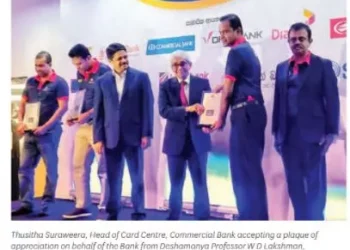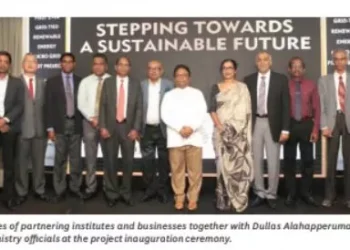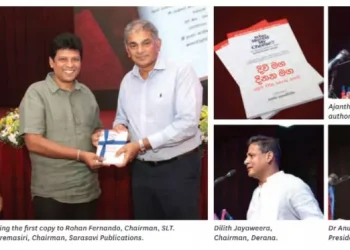Merrill J Fernando, Founder/Chairman of Dilmah completed 70 years in the Ceylon Tea industry and also celebrated his 90th birthday. His fighting spirit has always ensured that the country’s interests are protected. At the age of 24, he made a promise to himself to save the Sri Lankan tea industry from the clutches of multinational traders by introducing his own brand of tea. His commitment was to retain in our country the wealth, which accrued to foreigners, from the sweat and toil of our plantations workers. He has been successful in showing the path for others to follow. He has single-handedly taken the name of Ceylon Tea and Sri Lanka to the world. Merrill J Fernando believes that in business it is also essential to help others. Therefore, through the Merrill J Fernando Charitable Foundation many people are supported and given a second chance in life. He draws inspiration from God and believes that what you spend on the underprivileged is lending to God and that God repays you in abundance.
By Udeshi Amarasinghe. Assisted by Swetha Ratnajothi.
Photography Menaka Aravinda.
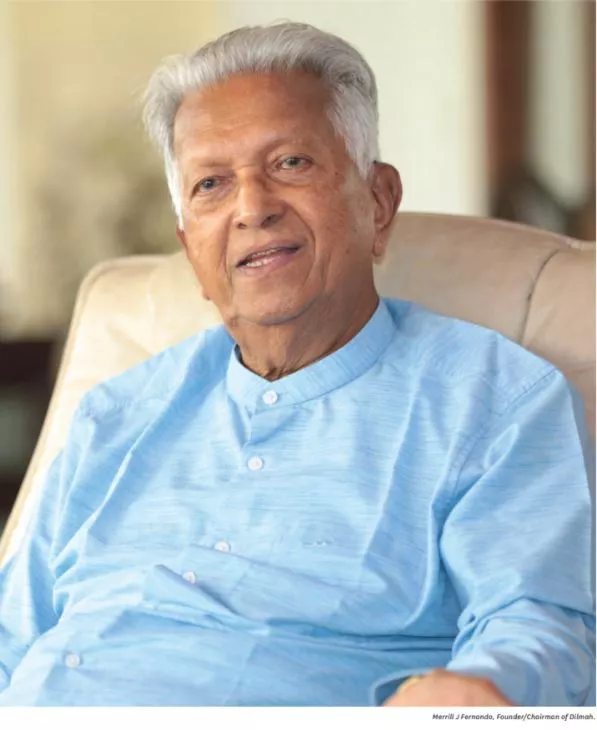
DO TRY IT
VIEWS (431194)
Merrill J Fernando, Founder/Chairman of Dilmah completed 70 years in the Ceylon Tea industry and also celebrated his 90th birthday. His fighting spirit has always ensured that the country’s interests are protected. At the age of 24, he made a promise to himself to save the Sri Lankan tea industry from the clutches of multinational traders by introducing his own brand of tea. His commitment was to retain in our country the wealth, which accrued to foreigners, from the sweat and toil of our plantations workers. He has been successful in showing the path for others to follow. He has single-handedly taken the name of Ceylon Tea and Sri Lanka to the world. Merrill J Fernando believes that in business it is also essential to help others. Therefore, through the Merrill J Fernando Charitable Foundation many people are supported and given a second chance in life. He draws inspiration from God and believes that what you spend on the underprivileged is lending to God and that God repays you in abundance.
By Udeshi Amarasinghe. Assisted by Swetha Ratnajothi.
Photography Menaka Aravinda.
If anyone asks you who is Merrill J Fernando, how would you describe yourself?
I am a humble villager who has achieved success in an unbelievable way. I often sit back and think of how I made this journey. I came from a humble home and my parents were simple people who had high values. I have no MBA but I have practical common sense. The credit for all that I have achieved goes to the Lord Above. He gave me unbelievable vision. At 24 years of age, I decided that I must protect the tea industry by having my own brand, inspiration after inspiration came from God. Even today what I do is my way of saying who I am.
I was an ordinary village boy and I studied at a good school. I went to tea estates and learnt about the tea industry. I learnt tea tasting under O P Rust and thereafter worked as a tea assistant at AF Jones & Co. I was selected to be trained in tea and I went to London to work at Joseph Travers & Sons. There, I saw the entire story of tea. It is due to the exposure and experience that I have gained that I decided at the age of 24 that I would establish my own brand of Ceylon Tea. The profits that are made by companies around the world are through the sweat, tears and toil of our workers. I decided that I would retain those profits in my own way in Sri Lanka. That is my journey and that is who I am.
I am happy for what I have achieved in life. I am very frank in my approach, who ever it is I will tell them exactly what I feel. I am known to say what I believe is the truth. I do not fear to tell anyone the truth and do the right thing. I am disliked in the tea trade ever since I switched from trading to marketing and built my own brand name for Ceylon Tea. Whenever I speak on tea I am critical of traders, who rely on selling cheaper and cheaper. They even want to import very cheap tea and mix with Ceylon Tea for re-export. I remain a strong opponent of imports because, if Ceylon Tea becomes cheap, our tea industry will become unviable within one year. Those who push the Government to liberalize tea imports, have no concern for the industry. My key supporter in this respect is Mr Harry Jayawardena of Stassen tea. I always follow my gut feeling when doing business. Some would come with feasibility reports and other such material for me to consider investing. Generally, they are good, honest and smart people but they have not done business to prove their success. They are theoreticians, I never go by feasibility studies.
You have been in Ceylon Tea for 70 years. What are your memorable experiences?
Sri Lanka is very much still deeply embedded in the colonial culture of exploitation in trade. The British wherever they went, provided infrastructure such as transport, roads and railways because they are essential for their industries. Tea, spices and rubber were grown away from main cities. To transport these crops they provided us with good logistical and administrative systems. Yes, they provided those facilities to the country, but they were part of exploitation. The process of selling tea even to this present day, the plantations and trade remain unchanged from the colonial culture. Why? Tea traders are supplying bulk tea and happy making a rupee of two on a kilo of tea, while foreign traders add value to our tea by mixing with cheap teas and selling them as Ceylon Tea in attractive packages at 15-25 times more than what was paid for bulk tea.
At the time I started the Sri Lankan Government itself was persuaded by multinational traders through their local representatives not to sell value added tea. They insisted that their companies in Sri Lanka sell bulk tea – raw material. But tea is not a raw material, it is a finished product. Once you add boiling water and brew, you produce a cup of tea. I was working for a British company at that time, AF Jones and Co. It was a family business of the father and two sons. They were lovely people and they treated me as their third son. At that time there were no tea bags so I asked them why we would not do our own value added packeted tea and export. They said it is not for us, the British do a great job. I did not go to argue, but I continued with my job. However, this was bothering me and eventually when I decided to create my own tea brand and export, multinationals told the Government that they would pull out of Ceylon Tea. I knew many of the officials in the Treasury and I showed them tea export figures of 1950s, 60s, 70s, and 80s to prove how other countries replaced Ceylon Tea progressively. Ceylon Tea imports declined dramatically over that period. I pointed out that in five years time their imports will be substantially lower. Tea exports to the UK alone declined in the following manner; 1970 – 70,735 MT; 1980 – 20,671 MT; 1990 – 11,673 MT; 2010 – 1,701 MT and 2020 end August – 835 MT.
I was asked how I would compete with the big traders who had already established in various countries. My answer was simple, most countries have enjoyed the quality and taste of Ceylon Tea when business was in the hands of family companies, which were progressively acquired by multinationals. Eventually, they were acquired by big traders who abandoned freshness, quality and ethics in moving to a mixture of blended tea from cheaper origins and relied on highly paid celebrities to promote their brands. My goal was not to compete with multinational traders but to bring back integrity, quality, taste, purpose and ethics to Dilmah tea to discerning consumers. I did not intend competing with them in quality or price. It would be the first tea in the world to be ethically produced. We grow tea, manufacture, add value, brand, market and bring earnings back to the country and share with the poor and the wider community. I fostered what looked like the impossible dream. Neither the Government nor the tea trade understood my philosophy.
I expected opposition from Australia as well as New Zealand, where I was going to launch my product first but I did not expect opposition from my own country. Local representatives of multinational companies presented fierce opposition. So did local reps of big national brands such as Australia, South Africa, and Canada. Up until the late 70s the whole world knew only Ceylon Tea. We had the Ceylon Tea Propaganda Board at that time and they spent millions of dollars on promoting foreign owned brands. When I realized how our advertising and promotional funds were invested in creating brands, which eventually will be our competitors, I advised the admin staff to encourage building Sri Lankan owned brands but they appeared opposed to this idea. I presented my proposal to the Members of the Board who welcomed it and offered exceptional facilities. I asked them the reason as to why I could not do my own brand.
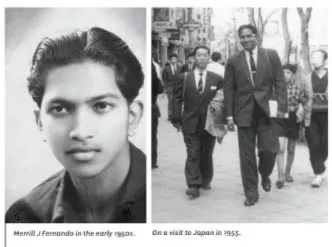
They started to change the rules so that, while foreign brands generously received all our funds, locals would not receive any. They said that if I started my own brand I would receive no support. I warned them to reverse their thinking and encourage local brand names. Sometime later, the Chamber of Commerce appointed me to the Ceylon Tea Propaganda Board. Soon I realized that the members on the Board did not know anything about marketing or tea. Our tea interests were represented by people who knew nothing about the trade, intricacies of tea or marketing. Then and now, the colonial culture prevails.
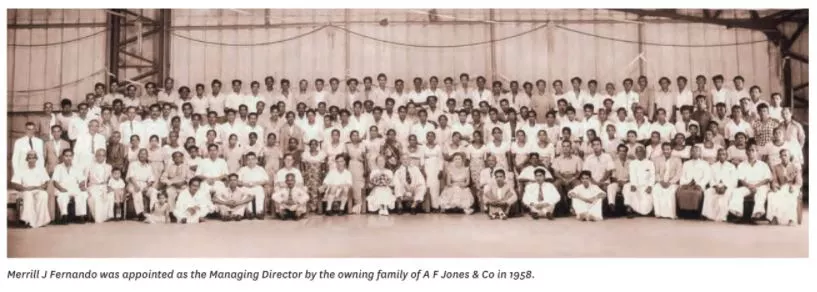
Dilmah owns the Kahawatte Plantations and I am humbled in stating that my vision for tea is different to most others in the industry. We are the world’s only vertically integrated company in the tea industry. I did not aspire to just sell tea.I am able to say, we grow our own tea, we have our factories and the facilities to do value addition, and we have a globally loved and renowned brand name – DILMAH Single Origin Tea – which is Sri Lanka’s only global brand name. No one else can make that unique claim today! I ask the traders why they do not want to have their own plantations and be vertically integrated like us. But they are not interested, they are strictly traders. Even at the auction it is about being cheaper than the other. If the auction price is 600 rupees per kilo, people are exporting value added tea for less. How do they do that? It is a bad situation. No one wants to make the effort to change.
We are doing a study of the structure of the tea plantation and we realized that there is the tea picker, then the kankani, assistant field officer, field officer and estate manager. The function of plucking the tea leaves is done by the tea picker and the kankani overlooks the process. The other three officers are not required in the tea plucking area, they maybe needed elsewhere. We felt that this investment could be utilized to support the tea pickers and pay them an incentive. However, there is opposition and unions do not agree. Therefore, we are bound by the old systems. Our culture believes that the established practices are the best. When you try to change the system there is always opposition. That is why we cannot progress in many areas. No one wants to take the initiative to change. I have fought my battles.
The only marketer is Dilmah and there are two other brands that have an earning with decent export prices. There is an awareness and great opportunity, which more people are looking at. The Government is making a serious blunder in taxing value-added exports. In fact, bulk tea exports should be taxed. There should be incentives for value added exporters such as being tax-free. However, we hope that in the next budget, this will be rectified where a level playing field will be created. A few years ago there was a discussion on bringing cheap tea from Bangladesh, South India, and Vietnam to be blended with our tea for export. I asked the reason for this and they said that they need to make money. Ceylon Tea fetches the highest price and is about two dollars higher than our competitors. The trade says that they cannot fetch good prices to sell. Then, I asked them whether we dump excess tea into the sea? No. Then we need to think differently. Even during the current situation Ceylon Tea is selling at a very good price.
They say that if we bring the prices down, we can sell more. But where is the crop? We would be selling other countries’ tea, using the name of Ceylon. The Government always held with me and did not allow this to happen. But that is their thinking, there is no love for the country or the industry, they want money. That is the colonial culture. You give nothing back to the country and nothing back to the industry, then how do we change that thinking? Our system has to change. Our education system from the kindergarten stage must change. We must inculcate the love and pride for the country. We must say ‘This is our country’. Sri Lanka is my home and we must make people to be proud of their nation, then people will join and grow our economy. They must be taught about the benefits of tourism and tea, which are both 100 percent local. We import nothing. President Gotabaya Rajapaksa has that commitment to change the structure of our country. He has his team and that team follows his advice and directions. The President has two- thirds majority and he can change so many aspects in this country. Today, the country is different and he can show what we can do in six months. If we are taught to love our country, then the processes would automatically follow. Even though my grandchildren too are studying abroad I have said they have to come back and serve the country.
Even your printing was done in Sri Lanka?
When I started I had many affiliated companies. My packaging was initially done in Singapore and Japan. But, that was very costly for me, and sometimes the shipments got delayed and we had to airfreight as well. I was getting some of my printing done at Nataraja Press, I knew Ravi’s grandfather very well. I asked them whether they could do the printing of my packing. They said if I could make an investment and purchase a Mark Andy printer they would be able to manage. On a trip to the US, I purchased the printer. The company was named as Print Care and I gave 50 percent of the shares to Ravi. We purchased another printing press for 60 million rupees, which increased the printing capacity greatly. Now it has grown to be one of the top five printers in the Australasia region. We can even print money, and lottery tickets. There is a demand because of the high quality of the printing. We not only print our own packaging but we also supply packaging to Harrods, Lipton, and Twinning.
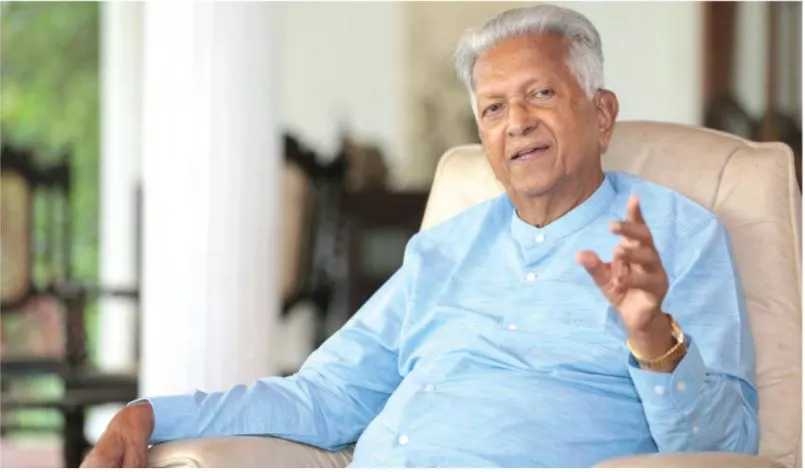
At a time when foreign names were given to brands, you decided to name your brand Dilmah, after your two sons. You took a huge risk?
At that stage if I tried to get a marketing company to advice me on a brand name it would have cost me a massive amount of money, which I did not have. Therefore, I decided to name the brand after my children. I called it Dilma and then when I took the name to Australia, the agency was nice to me and said the name does not look complete, that we should add an H at the end and it now balances well. I thought I would say that Dilmah, my brand is my third son.
That was another inspiration, my third child to be named after my two children who were small at that stage. The advertising agency in Australia asked me to hire a celebrity to promote the brand. We acquired the services of Kamal, who was a famous singer in Australia. He was born in Malaysia and he had some Sri Lankan connection as well. We brought him down and the first commercial was done with Kamal, as his voice was famous in Australia. He too was reborn with Dilmah. He cost us a lot of money, about AUD 60,000, which I could hardly afford. The Australian and New Zealand agency asked me, “Why do you want to hire people? You are the best person to advertise your tea.” After almost a year, I gave my consent. As I was leaving for Sri Lanka, I said we would shoot the commercial in a living room. After having a cup of tea, I just said, “I have devoted my life to tea, and it is named after my two sons, Dilhan and Malik.” “Do try it!”
The slogan ‘Do try it’ had a huge value so much so that when I walked on the streets in Australia and New Zealand, people used to call out to me saying ‘Do try it’. In New Zealand we acquired a 3.9 percent market share. The ‘Do try it’ advertisement was first aired in July. By September our market share had gone up to nine percent. We did a research and our consumers said, “This man has an innocent face and he doesn’t try hard selling” and he only says, “Do try it”. Others said he has named it after his two sons and he has his face on the pack. We trust him. The greatest assets we had is the brand name and placing my face on the packing because it represented that I was taking responsibility for my product. While in Australia and New Zealand, when I used to go on the road, people would call me Mr Dilmah and ask me if they could take a picture with me. They used to say, “You are not a faceless multinational. You have a face to Dilmah.” I was told that this was the highest compliment to receive. If you see any multinational product, who is the owner? The company is owned by investors, banks, and insurance companies who say they want an increase in profit every year. Their focus is on making money. The consumer was happy to know who owned and produced Dilmah tea. That is why in Australia and New Zealand they love Dilmah and they are able to relate to it. They know that this is my product and my sons and family come on TV so it is a family product because that is how I built the brand.
The multinational companies reduced their prices to knock Dilmah out of the market. They ran promotions at 85 percent of their sales, which means, when they are selling at two dollars, they are still making 35 percent margin, so what the customers drink is not good quality tea. The companies are now on sale because they have only one objective. The producer nor the customer is their concern; their goal is profit, to protect their CEOs. I knew at that time when they continuously reduced prices that they would not last. Their philosophy is completely different. When you reduce the price to that extent, product quality also reduces and the consumer realizes what they have been purchasing and they will move to another product.
Many of your distributors entered tea for the first time and they too are family businesses. Can you elaborate on this?
For instance, at that time the Polish Ambassador was a good friend of mine and his son wanted to become a distributor of Dilmah tea. I was hesitant initially because he was an engineer and did not have the knowledge. But my son persuaded me and I gave the distributorship to him. We asked him to come to Sri Lanka and we trained him in Ceylon Tea. We bought him a van for which he paid us back. Both his wife and him, and the family sold tea. He has set up a huge business and he exclusively sells Dilmah tea. He is a multimillionaire today. In Chile too we have a family company doing the distributorship. I used to attend global fairs with my employees and later with Dilhan and we would meet various people who are interested in us because we are a family company. The father and son visited us at three fairs and said, “You are coming to see us everyday but not speaking to us about doing business.” They worked with us and released the first order in Chile and today they are the number one in Chile. We visit them and I am known in many countries.
Our success in Russia is unbelievable. The Russian embassy was established in Sri Lanka in 1958. The ambassador wanted to establish a tea tasting facility and we did so on Thurstan Road. We spent a lot of time there and he wanted us to export tea to Russia. The subsequent ambassador was a very nice person and became very friendly with us. In 1988 when the Soviet Union collapsed, Russia wanted to import 20,000 tons of tea per month. I said I could give them consignments of 500 tons and then increase to 1,000 tons. I had to fulfil the order because they had given it only to me. I lost money on the exchange rate but on the second order they increased the prices so I would make up for the loss. I used to ship 100, 40 ft containers of tea per month from 1988 to 2002. During that intermittent period the mafia rose in Russia and became quite dangerous. We did all the business with the Government and they treated us well. Russia has gone through an interesting journey. It is a beautiful country, which is very progressive today. Once our distributor in Belarus phoned and told that they are bringing a plane to take tea. They were going to fly 16 tons of tea to Belarus. It was initially supposed to be nine passengers but 33 people arrived. They wanted to shop in our markets as well. I had some amazing experiences. We have our own officers in Poland, Russia, Australia and New Zealand. Those are the main countries.
What has your experiences been with the MJF Charitable Foundation?
My mother was a very nice lady and very humble. We were the leading family in the village. My great grandparents were buried inside the church as they helped the village greatly. My mother too engaged in charitable activities. She used to help the people with little things. Even when I got chocolates, cakes and biscuits she would give half of everything to the children in the village. I used to get very angry when she used to give away what I had received, and I would ask her why? And, she would explain that we must learn to help others. At 32, having started Dilmah and doing my own business, when I found out that I am making more money than I used to do, my mother’s helping attitude came to my mind. I had only 18 employees at that time and I explained to them that I would help them and their children. The employees at that time were loyal and very faithful and said, “You are looking after us so well, you do not have to do more.” I said, “ I want to give your children education free of charge and give them clothes, food and all what they require.” I said, “I will give scholarships to the brighter children.” Today all my staff in the offices, plantations and factories receive these facilities.
Recently, I had a very touching experience, where a boy and girl had passed out from the Medical College as doctors, and they came and visited me. They fell at my feet and sought my blessings. They thanked me and said that their parents are tea pickers. They said, “We want to give back to society like you have done, and treat our patients free.” I told them that I was very glad but I said that you cannot afford to do that because you need the money but the thought is enough for me because that means they have learnt the lesson of giving. We have instances where children have been qualified as doctors, architects and lawyers. One such girl spoke at one of our events in fluent English. She got up on stage and said my parents are rubber tappers in the Kahawatte plantations and I received a scholarship. If not my education would have finished with the village school. I received a scholarship from your Foundation and I passed out as a lawyer. She spoke freely in front of 500 people and she spoke perfect English. She has also spoken at our global conferences as well. We had a Buddhist monk, he got up and said that his parents were working in the rubber plantations and from the scholarship he received from the MJF Foundation, he is now at the university studying theology.
Another such touching experience was, during the award ceremony that we have every two years to felicitate employees who have completed service of 15, 25, 30 years and above. At one of the ceremonies there was a couple seated and I asked my son who that was. During the award ceremony my son asked me whether they could give a speech. He got on the podium and said, “My parents are tea pickers on your Kahawatte Estate. I received a scholarship, and attended university. I made a first division and entered Law College. Today, I am the magistrate in Jaffna and I have come to thank you.” Such success makes me happy. The Holy Bible states that what you give the underprivileged, comes back in ten times to you. And, it also says that what you spend on the underprivileged is lending to God and God repays you in abundance. I always mention this when I speak in public because I bear testimony to that fact. I have received in abundance 100 times.
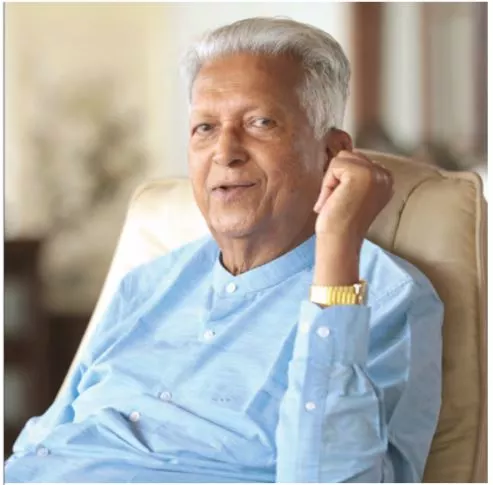
We have the MJF Kids Program for under- privileged children from low income families in Moratuwa and Peliyagoda. Our Rainbow Centre initiatives provide support to children with Cerebral Palsy, Down Syndrome and Autism. Whenever I visit this Centre, I am always in tears but I am proud of the progress they have made.
We also have a Youth Program, where we support youth between the ages of 17 and 30. The Center focuses on school dropouts, particularly following the Ordinary Level exam, and provides vocational training for girls in sewing, cookery and handicraft. Similarly, the boys training program trains young boys in carpentry, farming and agriculture, as well as linking them to the Curtiss Centre for Graphic Design and the Empower Culinary and Hospitality School. We work together with the World Association of Chefs Society and we support street-children as well. Through the British Council, we teach English so that the youth can learn various subjects and obtain training to find employment in their lives. The parents are very appreciative and say that I have saved their children because many were involved in narcotics before. One of the students participated in the French culinary awards, Bocuse d’Or and he is in Singapore and another is working in China.
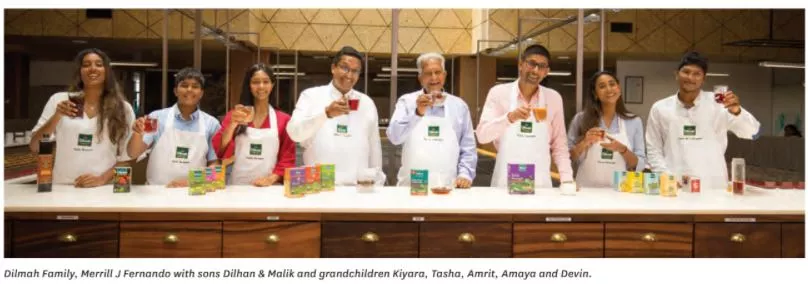
We started a larger centre for children in Kalkudah, Batticaloa as well on a 23-acre property. Here too children with Cerebral Palsy are taken care of. They do not stay the night, we have asked the parents to bring the children daily and we also pay the bus fare. I am planning to sell some property from which I intend to build 100 houses in Jaffna. Recently we built an emergency service for the hospital in Kayts, it cost us about 100 million rupees. I went to open the facility and there was a massive crowd. The doctors in Jaffna are very dedicated and they discussed with my son for over two years about the hospital and we were confident that they would look after the hospital well. At the opening small groups of people came and thanked me. They said “God has sent you here. It is a small village, we have every kind of poisonous snakes and the black spider is very poisonous in addition to all other diseases and for everything we had to go to Jaffna. Half of the people don’t have the bus fare. Now that you have given us this hospital, we will be here in five minutes.” I was very happy to hear those words. We are looking at building another hospital in Point Pedro. I have many lovely stories that I have gathered over the years that gives me great happiness. In London, I was paid only four pounds a week as salary. My income is doing substantially better today and we give 15 percent of pre-tax income of the companies to the MJF Charitable Foundation.
What keeps you motivated?
I went to learn tea to the UK in 1954. It was while I was there that I saw what was happening to our tea. I was 24 years of age. Ceylon Tea, was known for its premium quality, and what they would do is import tea from other cheap sources, blend it with our tea and sell as Ceylon Tea. I could not accept that. That is when I thought I would have my own brand of tea one day, which would bring quality, integrity, and honesty back to tea and give the consumers the finest tea on earth. Every single time I tried to abandon that thought, thinking that I would not be able to do this, a force would speak to me. I used to laugh at myself thinking that I was chasing an impossible dream with rainbows. That is why I say that the Holy Spirit kept encouraging me.
My greatest strength is divine inspiration otherwise I would not be doing anything. Everyday in the morning I say my prayers, and when I go to bed I say my prayers, I thank God for all that he has done in my life. I always make sure that whenever I go to the estate and the factories that I speak with the laborers and the workers. The employees are our strength and I always ensure that I speak to them and listen to their thoughts. We must make the people understand our country’s strengths. My sons Dilhan is in tea and Malik is in tourism. They too are original thinkers like their father. I always ensure that whenever I need to get something done and if I feel that it is the right thing to do then I will put my entire effort to get it done and succeed.
How do you want your children to take Dilmah forward?
They are both brilliant and totally committed. They will expand the business and continue the work of the Foundation. Their commitment is 100 percent plus mine. The structure of the business is such that it will continue to contribute 15 percent to the MJF Charitable Foundation and it will also inherit 25 percent of my wealth. My children and also my grandchildren will continue my work.


